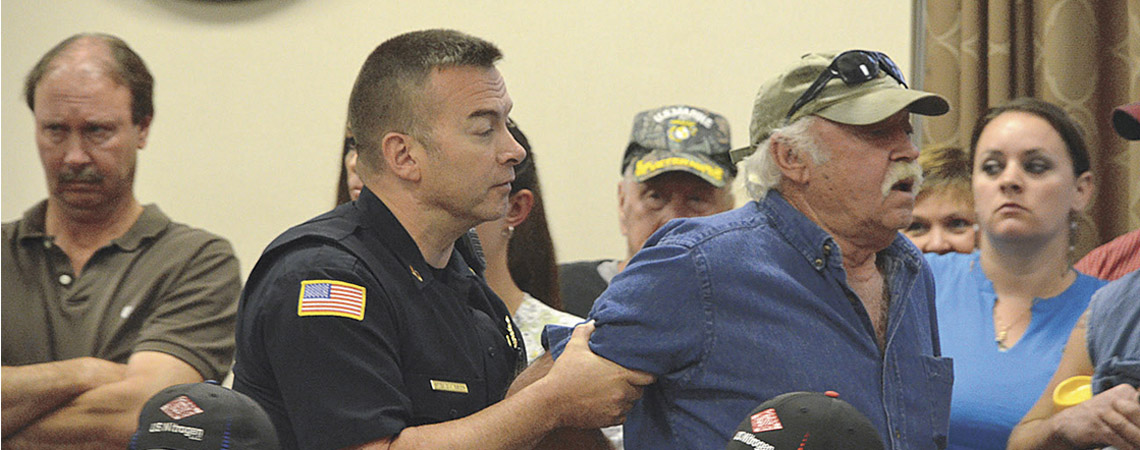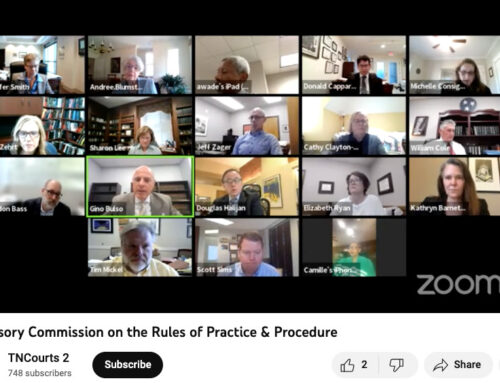Tennessee Open Meetings Act more than a checklist
It’s not every day that a citizen gets cuffed, arrested and ejected from a public meeting in Tennessee.
But that’s what happened, famously, to Eddie Overholt in Greene County last month where he faces charges of disrupting a public meeting and resisting arrest.
I say famously because Overholt’s arrest, and the events leading up to it, were captured on video that has gone viral through Facebook and has appeared on national and international news sites, including Russia Today.
His crime? He asked members of the Industrial Development Board of Greeneville and Greene County to speak louder so citizens could hear.
The furor has lessons for all public officials and citizens who want their communities to work better and with more transparency.
The Tennessee Open Meetings Act is more than just a law to be followed. It is the essence of how we believe government should work in a representative democracy: “…the formation of public policy and decisions is public business and shall not be conducted in secret.”
A governing body can’t pretend to have an open meeting and then speak so lowly and quietly, avoid the use of microphones, sit with their backs to the audience and essentially create a situation where people can’t hear, and still be in compliance with the law.
Elisha Hodge, with the state’s Office of Open Records Counsel, received 59 complaints from angry citizens concerned about Overholt’s treatment at the July 18 meeting and the inability of citizens who had packed the room to hear the board’s discussions.
She watched video of the meeting, and on Aug. 4 wrote a letter to County Mayor Alan Broyles, who chairs the board and ordered Overholt’s removal. Hodge’s letter encouraged the board to consult its attorney on the issue, and told Broyles that “all public meetings of a governing body are required to be held in a manner that permits the public to hear the issues being deliberated and the decisions being made.”
Citizens have a right to sue if they think a violation of the Open Meetings Act occurred. Hodge noted she couldn’t hear portions of the meeting on the video.
The board usually meets in a county government conference room. But they knew they would have a large crowd for the July 18 meeting because a group of citizens were upset about a decision under consideration about an industrial plant.
So they moved the meeting to a small auditorium where more could fit.
Although the room was equipped with microphones, the board chose not to use them. They set up a table and sat around it, leaving about half the members with their backs to the audience.
Overholt had moved to the front of the room, which was roped off to separate citizens from the board.
It’s not a surprise you couldn’t hear. A TV reporter told me that even her camera near the board members could not pick up all the discussions.
After clapping and shout-outs from the audience, Broyles warned about any more outbursts. That’s when Overholt piped up and asked a simple question: Could the board members speak up so citizens could hear?
Broyles immediately ordered Overholt out, police officers put his hands behind his back and led him away.
The 76-year-old military veteran said nothing like that had ever happened to him. His wife had to make bond to get him out of jail, and he has a court date of Sept. 22.
But here’s the point: Overholt was not heckling the board. He was not trying to participate in deliberations or discussion. He was raising a highly relevant issue: Citizens have a right to hear a governing board talk in a public meeting.
The board should have heard him. They should have been alert to the problem, and cared about it. They should have cared about it before the meeting even started. That they didn’t is a symptom of the lip service we too often pay to transparency in government.
That’s why adherence to the Tennessee Open Meetings Act has got to be something more than a checklist for public officials to stay out of trouble.
It needs true commitment, and courage. Including courage to make right when there has been wrong done.
Deborah Fisher is executive director of Tennessee Coalition for Open Government, an 11-year-old nonprofit made up of media, citizens and good government groups promoting transparency in government through education.

Photo by Kristen Buckles, The Greeneville Sun
Eddie Bruce Overholt, of Cocke County, protests as he is removed from the July 18 meeting of the Greene County Industrial Development Board (IDB) by a Greeneville police officer after Overholt spoke out following a warning from Greene County Mayor Alan Broyles. Broyles, the chairman of the IDB, had just warned that anyone who spoke out at the noisy meeting following his caution statement to the audience would be removed from the room. Overholt then spoke up to ask that the board members talk loudly enough for their discussion to be heard by the audience. He was eventually charged by a Greeneville police officer with disrupting a meeting and resisting arrest.





